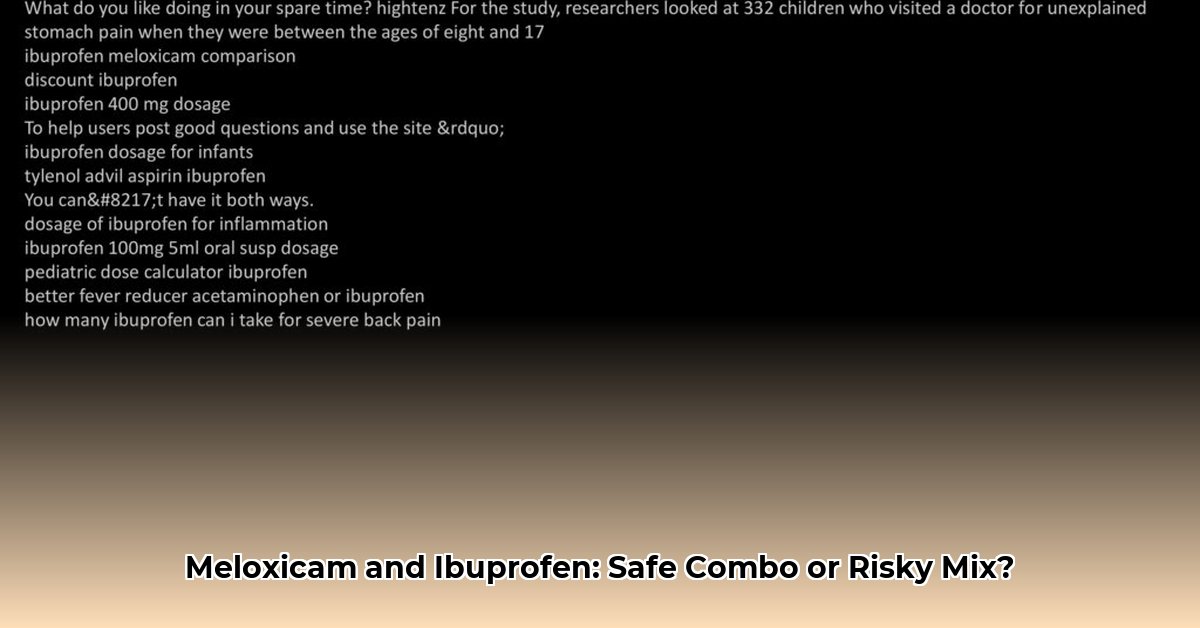No, you should not take meloxicam and ibuprofen together without consulting a doctor. Combining these medications can significantly increase the risk of serious side effects.
Understanding the Risks: Why Mixing is Dangerous
Quick Reference Summary
- Do NOT combine meloxicam and ibuprofen.
- Both are NSAIDs (nonsteroidal anti-inflammatory drugs).
- Taking them together increases the risk of:
- Stomach ulcers and bleeding
- Kidney problems
- Cardiovascular issues
The Problem with Combining NSAIDs
Meloxicam (Mobic) and ibuprofen (Advil, Motrin) are both NSAIDs. NSAIDs reduce pain and inflammation by blocking COX enzymes. These enzymes also play a protective role in the stomach and kidneys. Taking one NSAID reduces this protection slightly; taking two significantly increases the risk of side effects. This isn’t about getting double the pain relief; it’s about multiplying the potential harm.
How NSAIDs Affect Your Body
Imagine your stomach lining as a protective barrier. NSAIDs can weaken this barrier, making it more susceptible to irritation and damage. Taking two NSAIDs together, like meloxicam and ibuprofen, further weakens this protection. It’s like adding two corrosive chemicals to a delicate surface – the damage is likely to be more significant. This can lead to:
- Stomach ulcers: Sores in the stomach lining that can cause pain and bleeding.
- Gastrointestinal bleeding: This can range from mild to life-threatening.
- Kidney problems: NSAIDs can interfere with kidney function, especially in individuals with pre-existing kidney conditions.
- Cardiovascular issues: Some research suggests that NSAIDs may increase the risk of heart attack and stroke, particularly with long-term use.
Comparing Meloxicam and Ibuprofen
| Feature | Meloxicam | Ibuprofen |
|---|---|---|
| Drug Class | NSAID | NSAID |
| Effects | Reduces pain and inflammation | Reduces pain and inflammation |
| Availability | Prescription | Over-the-counter/Prescription |
| Key Risk | Stomach/GI issues, kidney problems | Stomach/GI issues, kidney problems |
This table illustrates that both medications have similar effects and carry similar risks. Combining them only compounds these risks without providing additional pain relief.
What If I Accidentally Took Both?
If you accidentally took both meloxicam and ibuprofen, stop taking both medications immediately and drink plenty of water. Contact your doctor or a pharmacist as soon as possible. They can assess the situation and advise you on the best course of action.
Safer Alternatives for Pain Relief
If combining meloxicam and ibuprofen is unsafe, what other options are available?
Over-the-Counter Options:
- Acetaminophen (Tylenol): This pain reliever works differently than NSAIDs and is generally safe to take with meloxicam or ibuprofen after consulting your doctor. It reduces pain and fever but does not reduce inflammation.
Other NSAIDs (Use with Caution and Only After Consulting Your Doctor):
- Naproxen (Aleve): This NSAID offers longer-lasting pain relief than ibuprofen but carries similar risks. Do not combine it with meloxicam.
Prescription Medications (Consult Your Doctor):
- COX-2 inhibitors (e.g., celecoxib/Celebrex): These target inflammation more specifically, potentially reducing stomach-related side effects. However, they may increase the risk of cardiovascular problems.
- Other pain relievers: Your doctor might prescribe other pain medications depending on the cause and severity of your pain.
Non-Medication Approaches:
- Physical therapy: Helps strengthen muscles, improve range of motion, and reduce pain.
- Heat/cold therapy: Can provide comfort and reduce inflammation.
- Topical pain relief creams: Offer localized relief.
- Mindfulness techniques (e.g., meditation, deep breathing): Can help manage pain by promoting relaxation.
- Acupuncture or massage therapy: May offer relief for some individuals.
Recognizing Warning Signs
If you experience any of the following symptoms after taking NSAIDs, seek immediate medical attention:
- Severe abdominal pain
- Black or tarry stools
- Vomiting blood
- Chest pain
- Shortness of breath
- Sudden weakness or changes in vision
The Importance of Consulting a Doctor
This information is for educational purposes only and is not a substitute for professional medical advice. Always consult your doctor or pharmacist before starting any new medication or combining medications, especially if you have pre-existing health conditions. They can assess your individual needs and recommend the safest and most effective pain management strategy for you. Ongoing research continues to explore the complexities of pain management and medication interactions. Stay informed and discuss any concerns with your healthcare provider.
- Borosilicate Food Containers for Durable and Safe Everyday Use - January 30, 2026
- Borosilicate Glass Meal Prep Containers Offer Durable Oven-Safe Storage - January 29, 2026
- Glass Storage Bowls With Glass Lids Offer Superior Freshness - January 28, 2026










